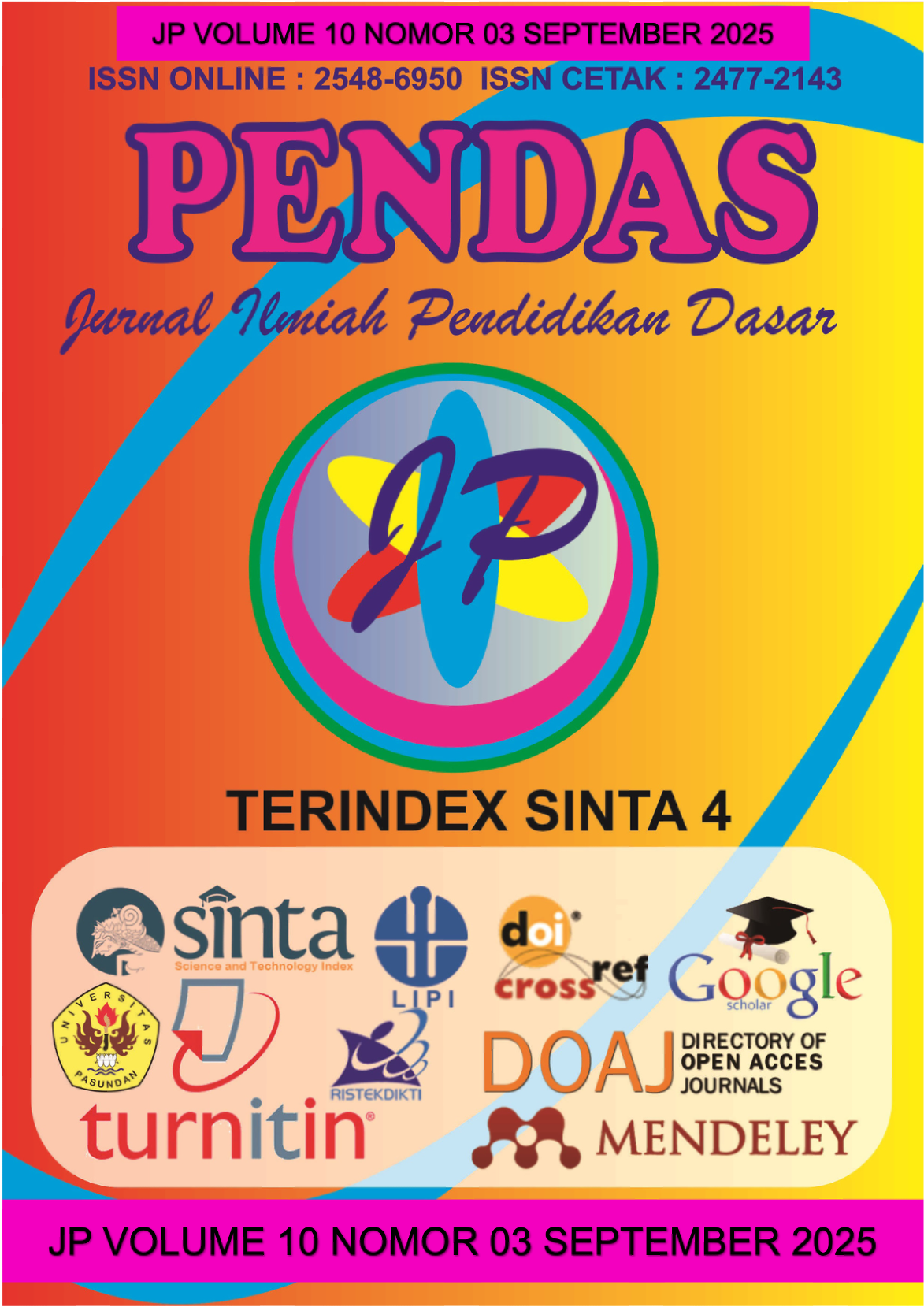Pengaruh Model Pembelajaran Problem Based Learning terhadap Keterampilan Berpikir Kritis Siswa dalam Pembelajaran IPAS di Sekolah Dasar
DOI:
https://doi.org/10.23969/jp.v10i03.33738Keywords:
Instructional Model, Problem-Based Learning, Critis Thinking SkillsAbstract
This study aims to examine the effect of the Problem Based Learning (PBL) model on students’ critical thinking skills in the learning of Natural and Social Sciences (IPAS) in elementary school. The background of this research is the low level of students’ critical thinking skills, which was also identified through observations at SDN Pasirsari 01. The research method used is quantitative experimental with a Nonequivalent Control Group Design. The research population consists of all 70 fifth-grade students of SDN Pasirsari 01, divided into an experimental class (VA) and a control class (VB), each comprising 35 students. The sample was selected using a purposive sampling technique. Data were collected through test instruments in the form of pre-tests and post-tests. The results show that the implementation of the PBL model in the experimental class was carried out in the “Very Good” category (86.7%). There was a significant difference between the learning outcomes of students in the experimental class and the control class, as evidenced by the post-test average score of the experimental class being 79.27, much higher than the control class average score of only 37.83. Hypothesis testing using the t-test showed a significance value of 0.000 < 0.05, indicating that the PBL model had a significant effect on students’ critical thinking skills. Simple linear regression analysis further confirmed this finding, showing a contribution effect of 86.6%. Based on these findings, it can be concluded that the Problem Based Learning model has a positive and significant effect in improving the critical thinking skills of fifth-grade students in IPAS learning.
Downloads
References
Affadil, M., Arent, E., & Sinurat, A. (2024). Keefektifan Model Pembelajaran Berbasis Masalah (PBM) dan Konvensional untuk Meningkatkan Kemampuan Berpikir Kritis Siswa Pada Mata Pelajaran IPS. Wacana Akademika: Majalah Ilmiah Kependidikan, 8(1), 55-68.
Amalia, N. S. A., Mahpudin, M., & Cahyaningsih, U. (2024). Pengaruh Model Problem Based Learning (Pbl) Terhadap Keterampilan Berpikir Kritis Siswa Pada Mata Pelajaran Ips Kegiatan Ekonomi. Buletin Ilmiah Pendidikan, 3(1), 45-56.
Ayuningtyas, K. W., & Eka, K. I. (2022). Peningkatan Keterampilan Berpikir Kritis Siswa Menggunakan Model Problem Based Learning. Prosiding Konferensi Ilmiah Dasar, 3, 816-822.Bandung: PT Remaja. Hal 24-25.
AAriani, R. F. (2020). Pengaruh model pembelajaran Problem Based Learning terhadap kemampuan berpikir kritis siswa SD pada muatan IPA. Jurnal Ilmiah Pendidikan dan Pembelajaran, 4(3), 422–428.
Dewi, H. R., Zein, A., Subariah, R., Asriani, Wismayanti, Y. F., Arifin, E., Eriana, E. S., Rinaldi, K., Khoisoh, L., & Ansyah, R. H. A. (2023). Konsep dasar metodologi penelitian. Yayasan Cendikia Mulia Mandiri.
Nuchus, C., & Gunansyah, G. (2016). Pengaruh Model Problem Based Learning Terhadap Kemampuan Berpikir Kritis Siswa Pada Pembelajaran IPS di Sekolah Dasar. Jurnal Penelitian Pendidikan Guru Sekolah Dasar, 4(2), 254230.
Ramdhani, N. P. (2022). The Relationship of Problem based learning with Student Learning
Ristianti, N., Handayani, S., & Permana, D. (2020). Pengembangan instrumen evaluasi pembelajaran. Yogyakarta: Pustaka Edukasi.
Setiawan, T. Y., Destrinelli, D., & Wulandari, B. A. (2022). Keterampilan Berfikir Kritis Pada Pembelajaran IPA Menggunakan Model Pembelajaran Radec di Sekolah Dasar: Systematic Literature Review. Justek: Jurnal Sains dan Teknologi, 5(2), 133-141.
Supriana, I. K., Suastra, I. W., & Lasmawan, I. W. (2023). Pengaruh model pembelajaran problem based learning terhadap kemampuan berpikir kritis dan hasil belajar IPA. PENDASI Jurnal Pendidikan Dasar Indonesia, 7(1), 130-142.
Sianturi, R. (2022). Uji homogenitas sebagai syarat pengujian analisis. Jurnal Pendidikan, Sains Sosial, Dan Agama, 8(1), 386–397. https://doi.org/10.53565/pssa.v8i1.507
Sunaryati, Febryana Syva, Savira, Nur Khasanah, M. J. (2025). Penguatan Pendidikan Karakter Kreatif dan Berpikir Kritis pada Anak Sekolah Dasar Melalui Diskusi Terbuka dan Debat dalam Pembelajaran Pendidikan Kewarganegaraan. Alacrity Jurnal of Education, 5(1), 325–337.
Sari, M. (2021). Analisis ketercapaian indikator dalam pembelajaran. Bandung: Alfabeta.
Selpia, D., Sutrisno, A., & Handayani, R. (2024). Statistik untuk penelitian pendidikan: Teori dan aplikasi uji nonparametrik. Jakarta: Penerbit Ilmu Edukasi.
Sugiyono. (2022). Metode Penelitian Kualitatif, Kuantitatif, dan R&d (Sutopo (ed.); 1st ed.). ALFABETA.
Veronica, A., Ernawati, E., Rasdiana, R., Abas, M., Yusriani, Y., Hadawiah, H., Hidayah, N., Sabtohadi, J., Marlina, H., Mulyani, W., & Zulkarnaini, Z. (2022). Metodologi penelitian kuantitatif. PT. Global Eksekutif Teknologi.
Wassalwa, M., Siregar, H. D., Janani, K., & Harahap, I. S. (2023). Analisis Uji Hipotesis Penelitian Perbandingan Menggunakan Statistik Parametrik Al Ittihadu, 3(1), 67–79.
Winarso, A., Siswanto, J., & Roshayanti, F. (2023). Pengembangan perangkat pembelajaran pada materi interaksi makhluk hidup dengan lingkungan ditinjau dari kemampuan pemecahan masalah dan berfikir kritis siswa SMP Negeri 2 Moga. Jurnal Kualita Pendidikan, 4(1), 16-27.
Yuafian, D., & Astuti, Y. (2020). Pengaruh Model Problem Based Learning Terhadap Hasil Belajar Tematik Siswa Kelas Iv Sd Negeri 101/Iv Kota Jambi. Jurnal Ilmiah Universitas Batanghari Jambi, 20(2), 48–53
Downloads
Published
Issue
Section
License
Copyright (c) 2025 Pendas : Jurnal Ilmiah Pendidikan Dasar

This work is licensed under a Creative Commons Attribution 4.0 International License.



















